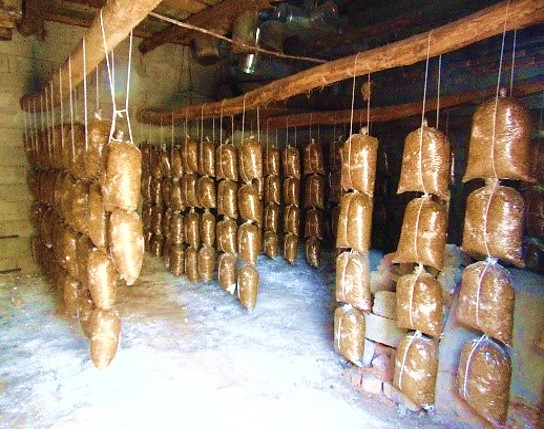
Mandani Charsadda is tobacco growing area. After tobacco is harvested, it is further cured in the tobacco barn. These barns are only occupied in the months of July to August. The rest of the year these are used for animal housing, storage or any other households needs. Looking to the potential and increasing market demand for mushrooms, Market and Employment Project by HELVETAS planned to build capacity of local women (tobacco growing families) in mushroom cultivation and provide them an opportunity to earn additional income from the available resources.
MEP organized a four-day training (2-5 November 2020) on mushroom growing in Haider Kaley, Charsadda for 20 women. The training is part of the agreement signed with Khyber Mushroom Farm, who is responsible for training, coaching, continuous monitoring and marketing of the product in the market. Farmers’ selection was done by Agriculture Extension Department Charsadda. Khyber Mushroom Farm has provided technical support, guidance and spawn initially for growing mushroom to tap the potential and enable tobacco growers to increase their income. Mostly all the training participants (Women & men) were ignorant of growing mushroom inside tobacco barn.

The timing for the use of tobacco barns is ideal for two reasons: first, they are vacant and can be used without any damage to the next crop. Second, the crop requires temperature between 22-27 degrees Celsius and humidity of around 80 per cent, which prevail during that period. While growing mushrooms, sufficient amount of water, oxygen and darkness is needed. Sterilization of the compost before spawning is another prerequisite which prevents it from poisoning.
The ingredients needed for the crop are easier to get. For 150 bags, quality substrate (wheat straw), lime (chuna), mushroom spawn, plastic bags and clean water are all that is needed for growing mushroom. It requires small investment i.e. its seed and other costs per bag costs around Rs. 87. An ordinary barn can accommodate around 150-300 bags and each bag can grow minimum 1kg and maximum 3kg of mushrooms in a period of 6 months,. A farmer can earn on average Rs. 500 per bag in one season.
“We start training our young ones from the age of eight or nine. Then when they turn twelve they do the work of an adult”
–Tajreeya
Mushroom growing requires little space, consumes little time, does not need hard work and can be grown even by women and children. 90% of the women in the training said that growing and processing tobacco is a challenge. Many health issues are related with it, such as they and their children get sick with nausea, headaches, respiratory illnesses, and skin conditions, and in some cases acute nicotine poisoning. Families that farm tobacco often have to make the difficult decision between having their children work or go to school. Unfortunately, working often beats education because tobacco farmers cannot make enough money from their crop to survive without the cheap labour that children provide.
Scope of mushroom growing:
This is a pilot testing of mushroom growing with families of tobacco growers (30 women and 30 men). They are trained with the technical support of MEP Project and Khyber Mushroom Farm. The families will adopt mushroom growing if they receive good return from this pilot phase. Currently learning from the on-job mushroom training, 45 more women are interested in growing mushrooms.
Challenges:
Currently, when the mushrooms are ready they will be bought by Khyber Mushroom Farms or if they get good price from somewhere else, they are free to sell their produce.
In future, marketing of the commodity may become a problem. The farmers have no access to and information about other buyers. There are many buyers in the market but the farmers are ignorant about them. MEP may help them in good market linkages.
Another aspect is that farmers are ignorant about mushroom seeds and know-how to grow oyster or any other variety. Guidance on the crop and provision of its spawns (seeds) to farmers could attract multitude of farmers to the sector.
“If we get good return from mushrooms, we will adapt to this farming practice in the future. We want to stop growing tobacco but cannot as it is a cash crop. It is tedious work and very challenging as many of us are suffering from different health conditions caused by tobacco growing.”
–Rehmat Bibi
Tobacco farming is a labour-intensive job. Farmers use their families to help them cultivate and perform other physically demanding tasks related to tobacco growing. Few of them hire labour charges to external labour. Tobacco farmers have little to no time and land to grow food or non-tobacco cash crops.
.
.

